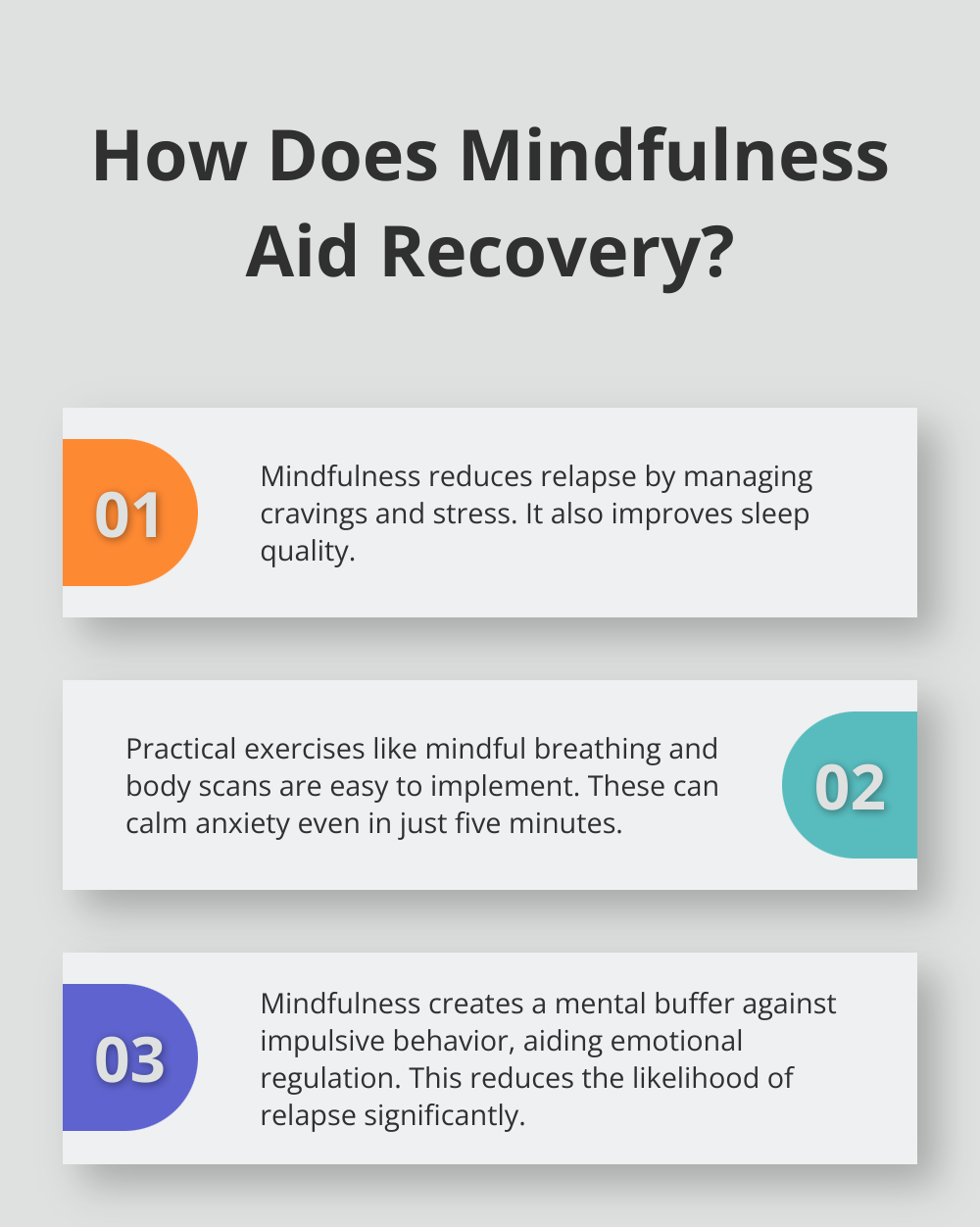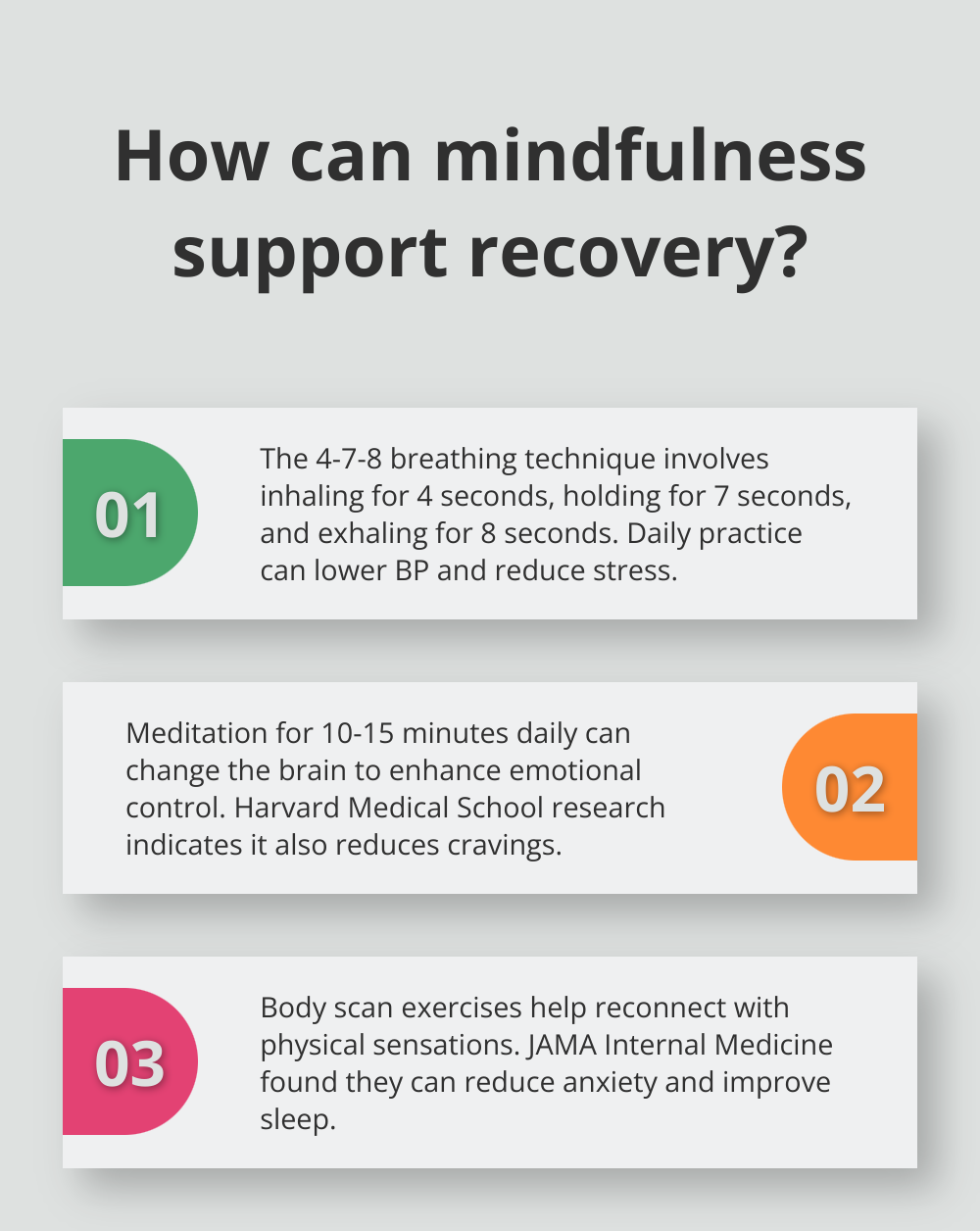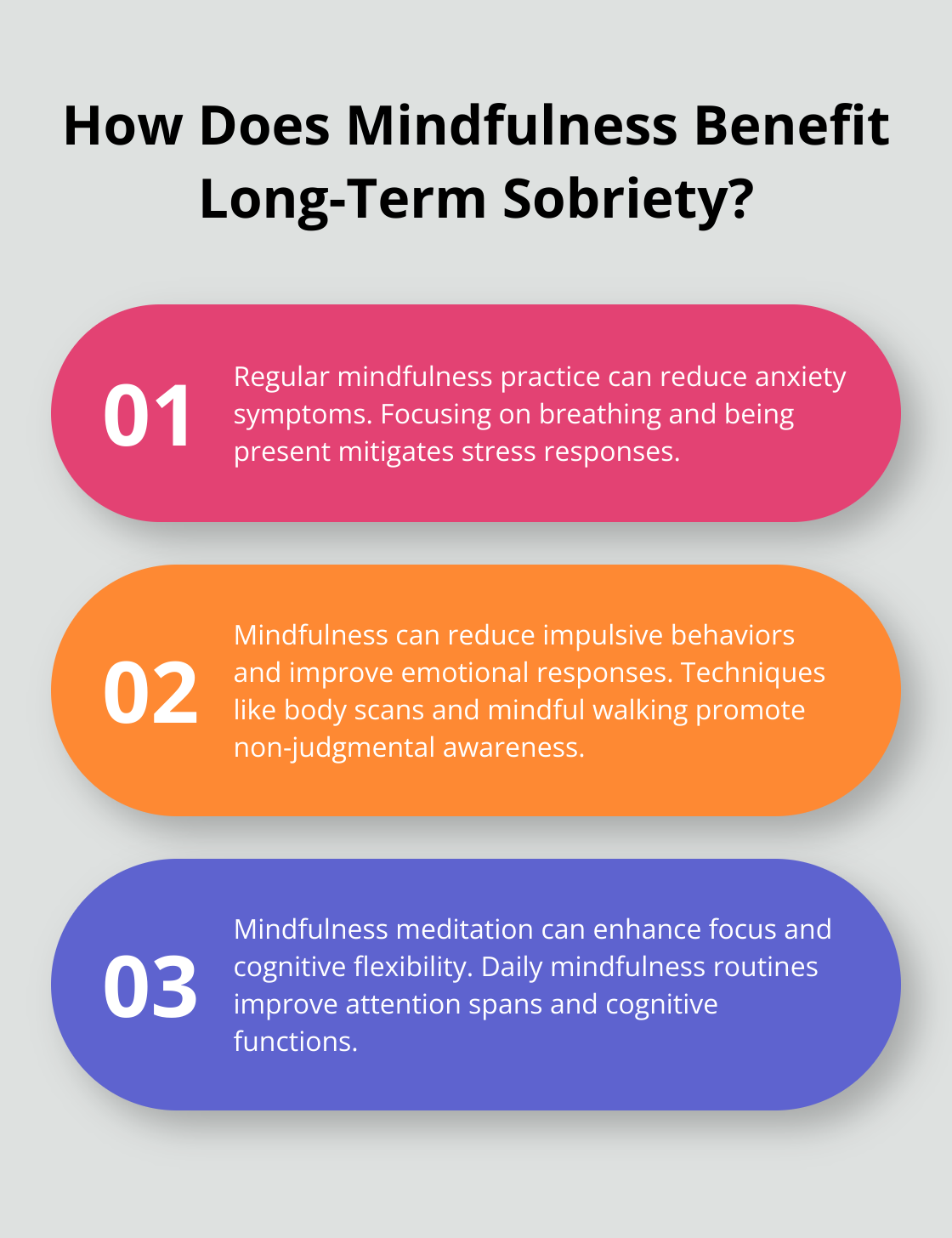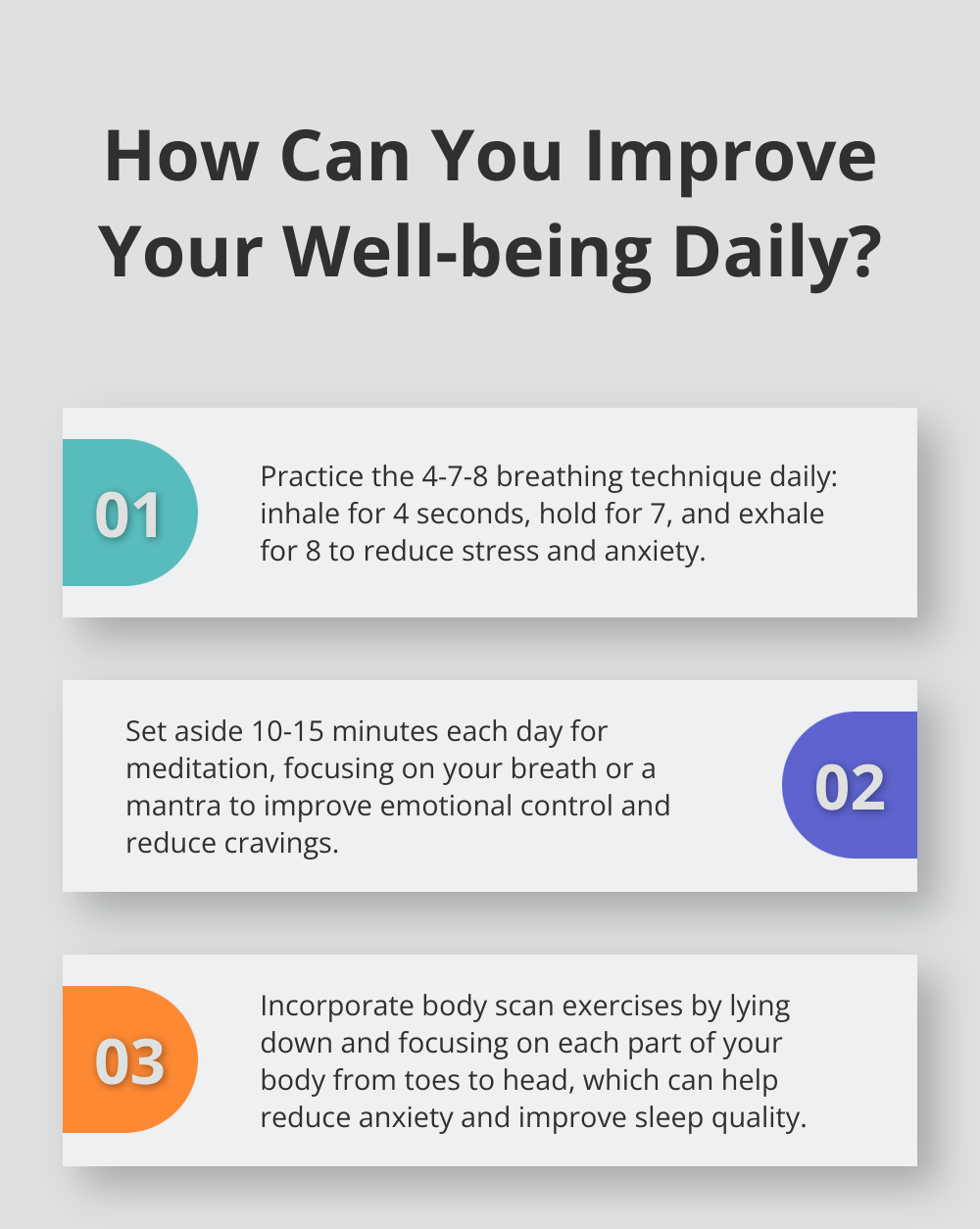Mindfulness is a powerful tool in recovery, helping individuals navigate the journey with greater clarity and resilience.
At Ona Treatment Center, we believe that incorporating mindfulness practices can significantly enhance the recovery process, offering practical ways to manage stress and improve emotional well-being.
In this blog post, we’ll explore essential mindfulness techniques and their benefits for long-term sobriety.
What is Mindfulness in Recovery?
Definition and Basics
Mindfulness is the practice of maintaining a moment-by-moment awareness of your thoughts, feelings, bodily sensations, and surrounding environment. This is done without judgment, allowing one to fully experience the present. At its core, mindfulness is about focusing on the here and now.
Incorporating mindfulness into daily routines can be a simple yet transformative step in recovery. Practical exercises such as mindful breathing, body scans, and guided visualizations can be implemented without any special setup. For example, focusing on your breath for even just five minutes can help ground you and calm anxiety.
Importance in Recovery
Mindfulness is crucial in recovery because it empowers individuals to respond to stressors and triggers with greater control and awareness. Research shows that regular mindfulness practice can reduce the likelihood of relapse by helping to manage cravings and emotional turbulence. Additionally, studies indicate that those practicing mindfulness experience improved sleep and lower levels of stress.
Incorporating mindfulness can reshape the brain, promoting emotional regulation and reducing impulsive behaviors. This is particularly vital for individuals in recovery, as emotional turbulence can often lead to relapse. Mindfulness helps create a mental buffer, making it easier to recognize and address negative thoughts and emotions as they arise.
Differentiating from Other Techniques
Mindfulness sets itself apart from other recovery techniques through its emphasis on present-moment awareness and non-judgment. Traditional therapy often focuses on unpacking past experiences or planning for the future, whereas mindfulness teaches individuals to stay grounded in the present. This immediate focus can be especially beneficial in managing acute stress or cravings.
Additionally, mindfulness does not require the extensive time commitment that some therapeutic techniques do. Simple practices, such as focusing on breathing or engaging in short meditation sessions, can be integrated seamlessly into daily life. This flexibility makes it a sustainable option for many undergoing recovery.

By integrating mindfulness into your recovery plan, you tap into a practical, evidence-based tool that supports long-term sobriety. Its benefits, measurable in reduced anxiety, better sleep, and decreased relapse rates, are well-documented and can provide a tangible improvement to the recovery process.
How to Integrate Mindfulness in Recovery
Breathing Exercises and Meditation
A foundational technique in mindfulness is controlled breathing. Simple yet effective, this practice can be executed anywhere. Start with the 4-7-8 technique: inhale for 4 seconds, hold your breath for 7 seconds, and exhale for 8 seconds. Daily deep breathing exercise (DBE) can lower resting blood pressure (BP) and reduce stress and anxiety.

Regular meditation is another pillar of mindfulness. Set aside 10-15 minutes daily for focused meditation. Sit comfortably, close your eyes, and focus on your breath or a chosen mantra. Research from Harvard Medical School shows that consistent meditation can lead to brain changes that enhance emotional control and reduce cravings.
Body Scan and Self-Awareness Practices
Body scan exercises promote self-awareness, helping you reconnect with your physical sensations. Find a quiet space and lie down. Gradually focus on each part of your body, starting from your toes and moving up to your head. Pay attention to sensations without judgment. According to research published in JAMA Internal Medicine, body scans can help reduce anxiety and improve sleep quality, which are crucial for individuals in recovery.
Another self-awareness practice is mindful walking. During a short walk, focus on the rhythm of your steps, the feeling of the ground beneath your feet, and the sounds around you. This practice can be particularly useful in interrupting compulsive thoughts and fostering a sense of presence and calm.
Journaling and Reflective Practices
Journaling is a powerful tool for reflecting on your mindfulness journey. Set aside 10 minutes each day to write about your thoughts, emotions, and experiences. Studies conducted by the University of Texas show that expressive writing can help process traumatic events and reduce stress, aiding recovery efforts. Write honestly about your triggers and how mindfulness helps you navigate them.
Incorporate gratitude journaling by listing three things you’re grateful for each day. This practice shifts focus from stressors to positive aspects of life, fostering a more optimistic outlook. Research from the University of California, Davis, indicates that practicing gratitude can enhance overall well-being and promote resilience, key factors in sustaining recovery.
What Are the Benefits of Mindfulness for Long-Term Sobriety?
Reducing Stress and Anxiety
Mindfulness plays a critical role in managing stress and anxiety, common hurdles in recovery. According to a study from the American Psychological Association, regular mindfulness practice can lead to a reduction in anxiety symptoms. By focusing on breathing and being present, mindfulness helps to mitigate immediate stress responses. For instance, incorporating breathing techniques such as the 4-7-8 method can induce a state of calm.
Improving Emotional Regulation
Emotional regulation is vital for those in recovery, and mindfulness has been shown to significantly enhance this capability. Research from the National Center for Biotechnology Information highlights that mindfulness practices can reduce impulsive behaviors and improve emotional responses. By practicing mindfulness, individuals can build a buffer against emotional triggers. Techniques like body scans and mindful walking help reconnect individuals with their physical sensations and promote a non-judgmental awareness of their emotions. This makes it easier to navigate emotional turbulence without reverting to old coping mechanisms, thus supporting sustained sobriety.
Enhancing Focus and Clarity
In recovery, clarity and focus are essential for making healthy decisions and staying on course. Harvard Medical School reports that mindfulness meditation can lead to structural changes in the brain that enhance focus and cognitive flexibility. Daily mindfulness routines, such as 10-15 minutes of meditation, can improve attention span and cognitive functions. Mindful practices, by allowing individuals to concentrate on the present moment, reduce distractions and improve decision-making processes. This heightened state of awareness and mental clarity can be a powerful tool in long-term recovery, providing the mental fortitude needed to maintain sobriety.

Conclusion
Mindfulness offers numerous benefits for individuals in recovery by reducing stress and anxiety, improving emotional regulation, and enhancing focus and clarity. These practices, such as breathing exercises, body scans, and mindful walking, are simple yet transformative tools that can be integrated seamlessly into daily routines.

At Ona Treatment Center, we recognize the power of mindfulness in supporting long-term sobriety. Our evidence-based Living in Balance program is designed to provide personalized and holistic care in a peaceful environment. This comprehensive continuum of care includes individual and group therapies, life skills development, and a supportive community to help individuals transition smoothly back to everyday life.
Exploring mindfulness further can be a valuable addition to your recovery plan. By practicing mindfulness regularly, individuals can cultivate inner peace and resilience, essential for overcoming the challenges of recovery.
For more information about our programs and how we incorporate mindfulness into our treatment approach, please visit Ona Treatment Center. Start your journey to a brighter future with us.


![Mindfulness in Recovery [Pro Tips]](https://onatreatmentcenter.com/wp-content/uploads/Mindfulness_in_Recovery__Pro_Tips__2024_06_26_07_11_12_387053_00_00.jpeg)



